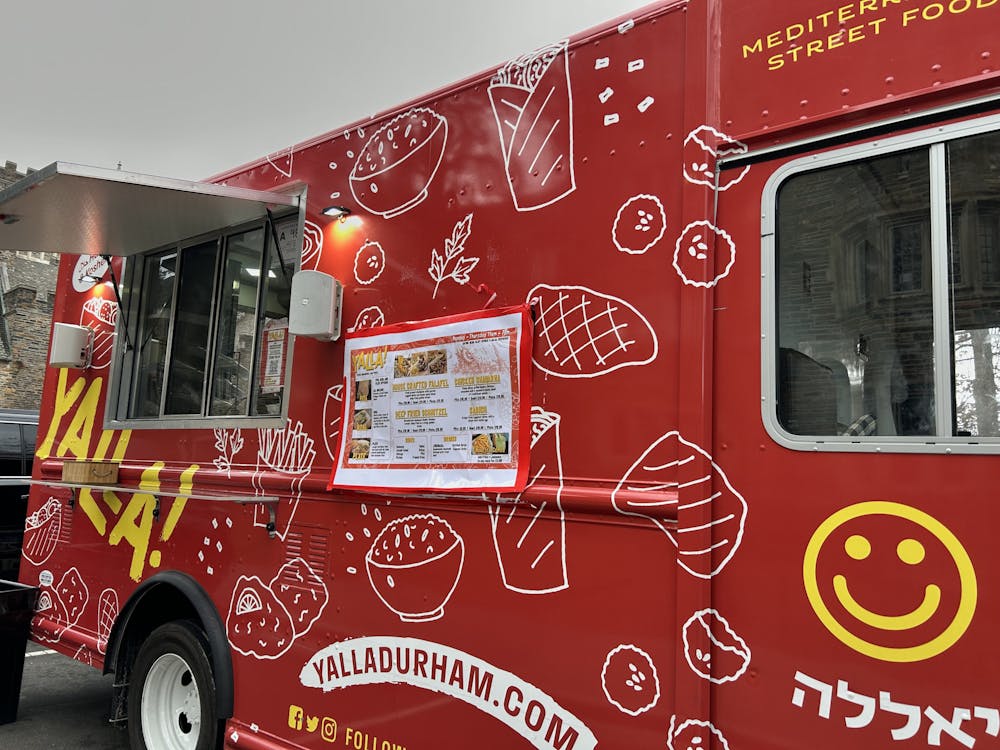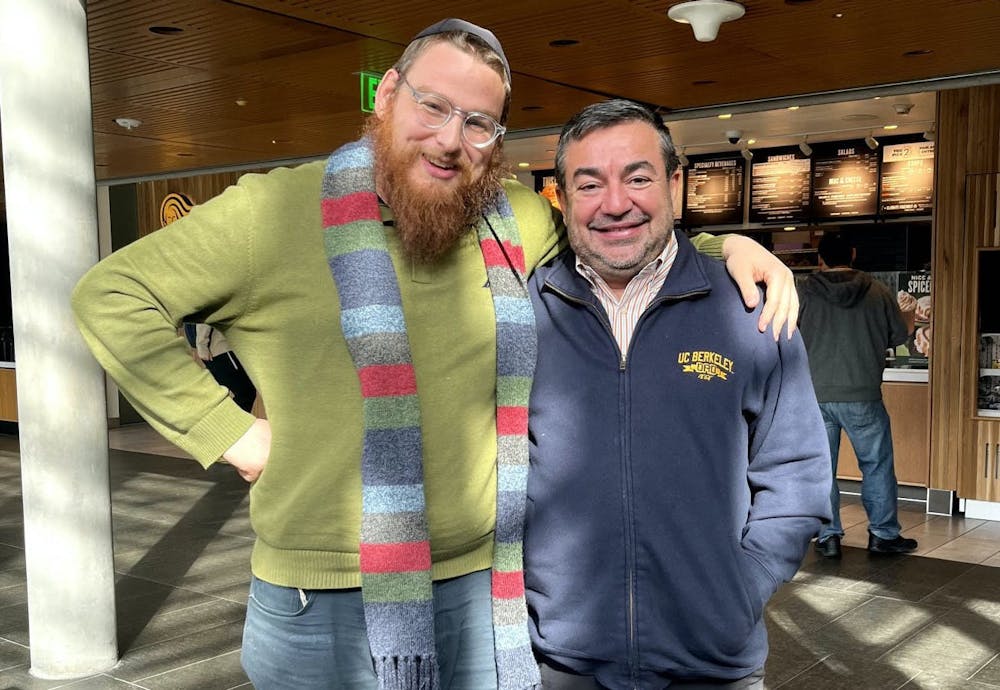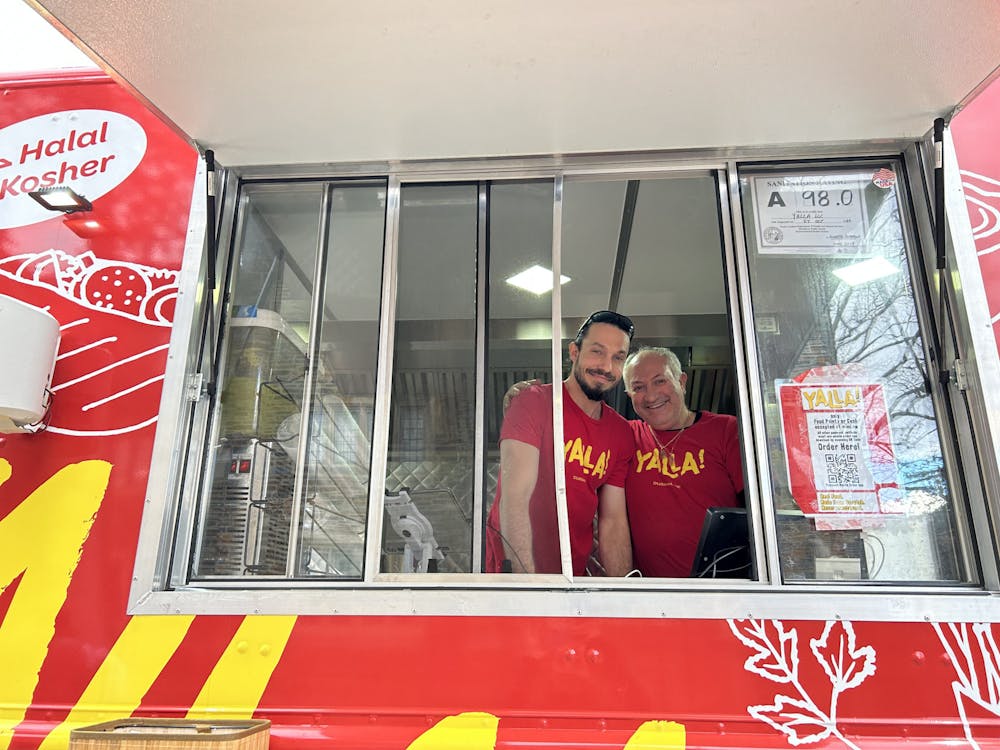“Yalla!” reads the yellow lettering on the bright red food truck parked across from the Student Wellness Center on most weekdays.
A word deriving from the phrase “ya Allah,” yalla is commonly used by both Arabic and Hebrew speakers in the Middle East to convey a sense of urgency — a shout of “let’s go!”
Daniel Alexander, one of the operators of the Yalla food truck, translated the word to “Hurry up, let’s go, let’s get moving!” which he said is perfect for the truck’s goal of getting food out to hungry customers quickly.
This bustle and vibrance is evident upon a visit to the truck. Alexander works the window and chats with students, often recognizing returning patrons by name. The smell of the fresh Mediterranean cuisine — including pita sandwiches, hummus bowls and limonana, a minty lemonade of Lebanese origin — waft out of the truck’s kitchen.
But the linguistic crossover in Yalla’s name also speaks to the truck’s larger mission: to serve as an interfaith bridge between Duke’s Muslim and Jewish communities.

'Creative ways to respond to this constant polarization'
Yalla is the first food truck that is both kosher- and halal-certified in Durham, and the first orthodox kosher-certified food truck in North Carolina.
“It is serving the Jewish and Muslim communities who are very observant when it comes to dietary restrictions, and it's also serving the entire Duke community, not only just Jews and Muslims,” said Imam Abdullah Antepli, associate professor of the practice of interfaith relations. “Whenever I go, I see these pockets of really inspiring conversations as a result of this food culture.”
Antepli, a recent recipient of the Anti-Defamation League’s Daniel Pearl Award for his work promoting interfaith dialogue and religious tolerance between Jews and Muslims, first came to Duke as the University’s first Muslim chaplain in 2008. He is also an associate professor of the practice in the Sanford School of Public Policy.
He is in charge of providing Yalla’s halal certification, a Muslim standard for dietary practices based on guidance in the Qur’an.
“Leaders of these communities have to find out creative ways to respond to this constant polarization, to bring together and unite our communities as meaningfully as possible,” Antepli said.
His sentiments were echoed by Rabbi Nossen Fellig, co-director of the Fleishman House, which is home to Duke’s Chabad community. Fellig provides the truck’s kosher certification to meet Jewish standards of food preparation. His role is shared by a full-time kosher supervisor on the truck.
Antepli pointed out that Israeli-Palestinian conflicts have grown, bringing ideological divisions to college campuses. Duke is no stranger to these conflicts, including debates over Duke Student Government funding for pro-Palestinian speakers in March 2022 and pushback from some students during the speaker event in April.
However, the two religions share more than many people realize, Antepli said.
“We are two distinct religions with incredibly similar ethical and moral values,” Antepli said. “Our belief in the living God, that our God is involved in every aspect of our life, including our food, is so similar.”
Rather than simply following politics and asserting that Jews and Muslims are destined to hate each other, Antepli said people can look through a lens of cuisine and culinary culture to understand that the two groups are not.
Through Yalla, Fellig and Antepli hope to connect both religious groups via the roots of their forefathers.
Get The Chronicle straight to your inbox
Sign up for our weekly newsletter. Cancel at any time.
“Abraham, our shared grandpa, looked at food as more than a vehicle for itself, more as a vehicle for education,” Fellig said. “The Bible talks about the tent he had in the desert, feeding the hungry, but it wasn't just for the purpose of feeding the hungry: he was really there with the inner mission to educate, to guide and inspire.”
Fellig and Antepli work together to determine which foods the truck will serve that meet both kosher and halal requirements. For example, at one point, Fellig wanted to incorporate a chocolate ball dessert which involves cooked-out rum — acceptable under kosher standards, but as Antepli informed him, unacceptable under halal standards.
According to Antepli, kosher standards are generally more stringent than halal standards. If something is strictly kosher — excluding alcohol — it theologically and religiously translates itself well to halal.
“It's a testimony to our friendship and to the dignity of the whole project. If the truck would have served alcohol, and cleaned up properly … [the truck] could still be halal in the basic level,” Antepli said. “But out of Rabbi Nossen and the Chabad community’s commitment to Jewish-Muslim collaboration, they wouldn’t touch [this dessert] ever.”

Keeping things affordable
Almost everything at Yalla, except their pitas and french fries, are made from scratch and served on the same day. Since nowhere in North Carolina prepares meat to the truck’s standards, meat has to be shipped in from Atlanta, Ga. All other ingredients are purchased locally, and hummus is made in-house.
Even with all of these considerations, Yalla’s menu pricing is comparable to most vendors on campus. Sometimes the truck offers deals, like pita punch cards, 25% discounts to refer a friend and the occasional free limonana.
“When I started working with [Fellig], he said, ‘You, know, it’s great if we make money, but that’s not why we’re doing this,’” Alexander recalled.
Yalla’s affordability is made possible by the community support behind it.
“[Donors] saw this vision that [Antepli] and I had of bringing the communities together … a light upon the nations and … a good role model for other schools,” Fellig said.
A group of Duke alumni ended up coming together to purchase the truck, which cost more than $200,000, Fellig said, and a donation from the University allowed the truck to open.
‘Owned by Duke’s landscape’
Yalla’s immediate goal is to get the word out about the truck.
“I think we still haven’t reached a wide portion of campus,” Alexander said.
Fellig says they've gotten great feedback from students about "the food itself, that it's delicious, but ... also about the general idea of it, how innovative it was."
“[Yalla] is owned by Duke’s landscape,” Antepli said, noting that many faculty and staff members also frequent the truck.
Fellig and Antepli prioritize increasing the reach of the truck and planning more programming around Jewish and Muslim religious calendars. Antepli noted that the approaching holidays of Ramadan and Pesach would give Yalla an opportunity to build community.
In the more distant future, both are open to the idea of opening another Yalla truck elsewhere.
“We did have quite a few other campuses that reached out to me considering doing the same idea,” Fellig said.
Antepli recalled some of the project’s initial skeptics, who made comments like, “‘There's a war in the Middle East, people are dying. There's so much hate, and you guys are just doing this cute project. What difference is this going to make?’”
Those who saw this project as a drop in the bucket, he said, came around once they saw the relationships formed, the education provided and stereotypes and bigotry dispelled by Yalla.
“These drops are so qualitatively powerful; it may be just one drop quantitatively. But once you put a drop of light into the bucket of darkness, it really enlightens a much larger space,” Antepli said.
Anisha Reddy is a Trinity junior and a senior editor of The Chronicle's 118th volume.

